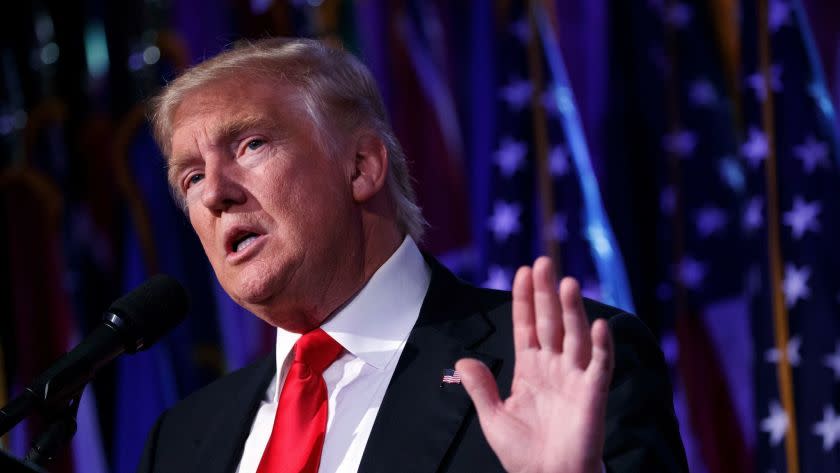Opinion: Trump's demand for election-night results is deceptive and dangerous

Call it the trial balloon that launched a thousand punctures. On Thursday morning President Trump tweeted: “With Universal Mail-In Voting (not Absentee Voting, which is good), 2020 will be the most INACCURATE & FRAUDULENT Election in history. It will be a great embarrassment to the USA. Delay the Election until people can properly, securely and safely vote???”
The suggestion that the Nov. 3 election could be delayed was immediately condemned, and Trump was treated to several remedial lessons about who is responsible for fixing the date of the election. (It’s not the president.)
But it was another Trump tweet on Thursday that caught my attention, one that signaled how he might seek to discredit the results of an election he can’t postpone.
“Must know Election results on the night of the Election, not days, months, or even years later!” Trump tweeted Thursday afternoon.
In a similar vein, Trump said this at a White House briefing: "You know, so many years, I’ve been watching elections. And they say the 'projected winner' or the 'winner of the election' — I don’t want to see that take place in a week after Nov. 3 or a month or, frankly, with litigation and everything else that can happen, years. Years. Or you never even know who won the election."
Trump is probably exaggerating the likelihood of a long period of suspense before results are clear. Edward Foley, an election law specialist at Ohio State University’s law school, told the Hill that, while a large number of mail-in ballots might result in some delay, the process should not take longer than a month.
If you were charitable, you could dismiss Trump’s insistence on same-day results as the cranky impatience of a television addict. But it has a more sinister interpretation: that delayed results are an indication that something fishy is going on, maybe even the manufacturing of votes. So Trump’s comments about delayed results must be read in the context of his fear-mongering about inaccuracies and fraud connected to the expanded voting by mail necessitated by the coronavirus.
There is nothing legislators or election officials can do to prevent Trump from sowing suspicion about election results, especially if he loses. But his misinformation campaign could be less successful if Congress and the states took steps to reduce the delay in counting absentee and other ballots. For example, California Gov. Gavin Newsom has signed legislation allowing county election officials to start processing mail-in ballots 29 days before the election.
But it’s also important that election officials — including Republican secretaries of state — counter Trump’s insinuations by reminding voters that there is nothing sinister about a tabulation that lasts beyond election night, especially in an election in which the coronavirus pandemic has necessitated increased voting by mail.
The news media can also play a constructive role, by recognizing that a rush to declare a winner — problematic even in normal election years — is especially ill-advised this year. Trump isn’t the only television viewer who has come to expect the immediate gratification of an election night result. Indulging that expectation is irresponsible — and plays into Trump's hands.

